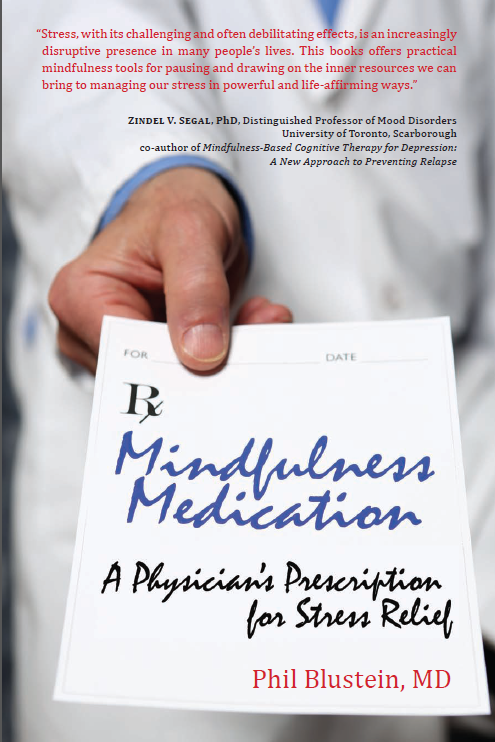Oct. 26, 2015
'Mindfulness gives us insight in how our minds work'

Blustein created The Breath Project, a website that teaches how to de-stress using mindfulness.
Stress is one of the biggest factors in both causing and aggravating illnesses. As a gastrointestinal doctor who specializes in diseases of the digestive system, Dr. Phil Blustein has seen first-hand the effects it has on his patients.
In response to this observation, Blustein created The Breath Project, a website that teaches Canadians how to de-stress using mindfulness.
The website has a series of videos, tutorials and Mindfulness Medication: A Physician’s Prescription for Stress Relief, a free e-book download.
Blustein, who is an associate professor at the Cumming School of Medicine, recently spoke to UToday about his book. He will be hosting a book signing on Nov. 1 from 11 a.m. to 4 p.m. at Indigo Books in Signal Hill.
Q: Why are Canadians stressed?
A: Recent studies demonstrate that 75 per cent of Canadians are dealing with a major stressor in their lives. Mounting economic and family pressures contribute to increased stress levels and coping habits, such as alcohol, drugs and overeating are obviously not helpful.
As a gastroenterologist, a specialist in diseases of the gastrointestinal tract (ie. stomach, liver, pancreas and bowel), one would think that the patients who come and see me have real, 'organic' medical problems. However, I find that 70 per cent of my patients have underlying stress that is the root cause of their problems.
What’s interesting is that both patients and doctors are often not aware of the connection between stress and illness and how it’s reflected in the presenting health issue. A very helpful and important question a doctor can ask a patient is, “What was going on in your life when you developed your problem?”
Q: Do Canadians need to relax? What sorts of health-related problems can happen as a result of stress?
A: Canadians do need to relax but the majority of people simply don’t know how. Most people get up in the morning and their minds are already racing with what needs to be done that day or what happened in the past. There’s no time for now. We pay a price for this constant thinking. Stress is how the body responds to a real or imagined threat. We might not have to worry anymore about a tiger eating us but everyday demands are just as frightening.
When everyday demands increase our stress levels on a regular basis, all kinds of health problems may result. Stress activates the sympathetic nervous system, which prepares us to either fight or run. This affects us physically and emotionally. With chronic stress, our systems can no longer compensate and physical problems can develop. These problems can include an increased risk of infection, the aggravation of existing problems such as Crohn’s and colitis, and worsening hypertension.
If stress continues unchecked, the big three killers, heart attack, stroke, and cancer are much more likely to occur. The emotional toll of stress includes anxiety and depression, as well as various eating and sleeping disorders.

“Mindfulness Medication: A Physician’s Prescription for Stress Relief” is a free e-book download.
Q: What resources can people access on your website?
A: I recognized how stress played a key role in my patients’ illnesses and I wanted to provide a resource that they could easily access for stress management. In collaboration with an international team of professionals, I created The Breath Project website. The website is an incredible collection of stress management techniques. It has got marvellous animated videos that teach all about stress and how it operates. Other animations guide the viewer through some relaxing breathing exercises. There are also many videos of renowned experts, who generously offered their time to talk about mindfulness, meditation, body scanning and breath-control as effective stress-reduction tools.
The Breath Project offers a free digital download of a book I wrote called Mindfulness Medication: A Physician’s Prescription for Stress Relief. The book outlines stress-fighting techniques that include Eastern concepts of mindfulness and meditation as well as the Western concept of how to more effectively dialogue with your inner voice to reduce the effects of stress.
Q: What is mindfulness?
A: Mindfulness is a wonderful technique that changes the relationship you have with your experiences. It consists of focusing your attention on whatever is happening in the present moment, such as your breathing, thoughts, emotions or physical sensations.
Mindfulness asks you to take the position of an observer and notice your experiences with acceptance and without judgment. Mindfulness gives us insight in how our minds work and the influence that our conditioned past plays.
With mindfulness you don’t silence the mind or change anything. The goal is not to be free of pain, anger, sadness or other stressful thoughts, but rather to be free to be with whatever mental or emotional state is present. As such, you are not fighting with your experience and this reduces the stress response. Another outcome of mindfulness is that your actions tend to become wiser and more compassionate and this also helps life to feel a little less stressful.
Q: Your website and book focus on mindfulness, what are some other techniques we can use to reduce stress?
A: There are many wonderful techniques available for stress management. Any given technique may work better for one individual than another and sometimes it takes more than one approach to de-stress. One of the most effective and accessible techniques for stress reduction is to consciously breathe so as to promote relaxation.
Additionally, Western-based cognitive therapy is very effective and can be used in conjunction with Eastern-based mindfulness, breathing and meditation techniques. What you think is what you believe, but you can change the way you interpret your experiences so that they cause you less stress.
